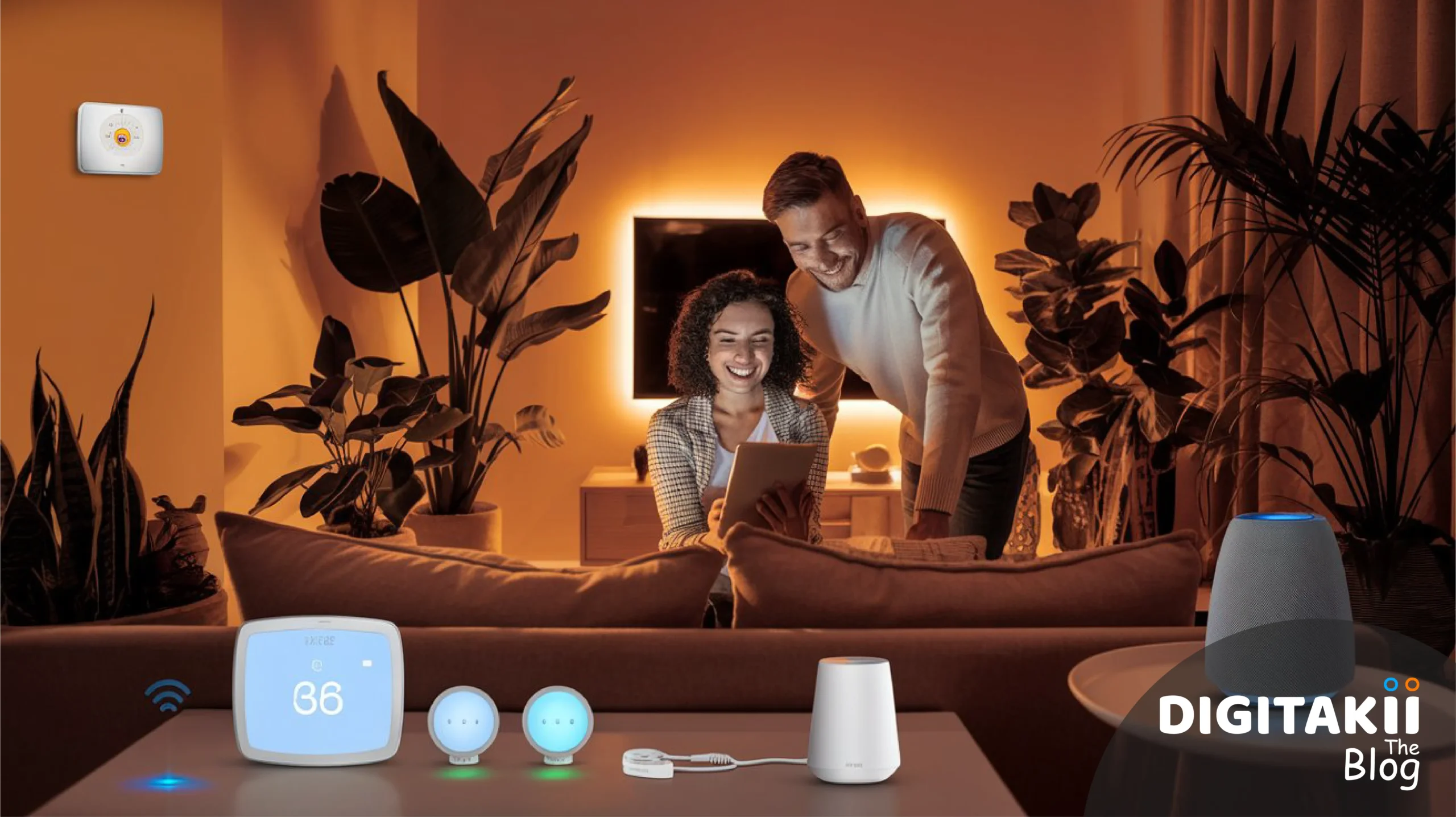Why Smart Home Devices Are a Game Changer
Smart home devices are more than just gadgets; they’re investments in both comfort and sustainability. With everything from intelligent thermostats to energy-efficient lighting, these devices make it easy to cut down on utility bills and reduce environmental impact. Not only are these devices smart, but they also make you a smarter energy consumer. After all, saving energy means saving money, and who doesn’t want to see lower bills each month?
Let’s dive into nine of the best smart home devices that promise to save money, conserve energy, and even enhance the value of your home.
Smart Thermostats: Efficient Climate Control
One of the most effective smart devices for energy savings is a smart thermostat. By adjusting temperatures when you’re asleep or away, these thermostats help avoid unnecessary heating or cooling. They often come with learning capabilities, adapting to your preferences and schedule.
Benefits of Smart Thermostats
- Automatic Adjustments: Based on occupancy and weather conditions.
- Learning Capabilities: Some thermostats adapt to your routine, ensuring the optimal temperature when needed.
- Energy Reports: Many provide insights on usage patterns, helping you make more informed adjustments.
Top Picks for Smart Thermostats
- Google Nest Thermostat: Known for its user-friendly interface and energy-efficient design.
- Ecobee SmartThermostat: Comes with room sensors to manage the climate across different areas.
Smart Lighting: Illuminating Savings
Lighting is another area where small changes can lead to significant savings. With smart lighting, you can control when lights are on, how bright they are, and even what color they emit, all while conserving energy.
LED Smart Bulbs
LED smart bulbs use considerably less energy than traditional incandescent bulbs and last much longer. With app-controlled brightness and scheduling options, you can customize lighting to suit your needs.
Motion-Sensor Lighting
Motion sensors help reduce energy waste by turning off lights when no one is around. They’re perfect for places where lights are often left on, like hallways and bathrooms.
Smart Plugs: Energy Control Made Easy
A smart plug turns any electronic device into a smart device. Imagine turning off lamps, fans, or even kitchen appliances with just a tap on your phone or a voice command.
Scheduling and Remote Access
- Energy Monitoring: Some smart plugs show you the energy consumption of the devices they’re connected to, offering a clear view of which appliances use the most energy.
- Remote Access: Allows you to turn devices on or off from anywhere, ensuring you don’t waste energy when you’re not home.
Best Smart Plugs for Savings
- TP-Link Kasa Smart Plug: Highly reliable with easy integration into smart home systems.
- Amazon Smart Plug: Works seamlessly with Alexa, allowing for voice control.
Smart Power Strips: Avoid Phantom Energy Drain
Phantom energy or standby power can account for 5-10% of a household’s energy consumption. Smart power strips shut off power to devices when they’re not in use, eliminating this wasted energy.
How Smart Strips Work
- Energy Detection: Some strips detect when devices are fully charged or not in use and automatically cut power.
- Control Zones: They allow specific devices to stay on while cutting power to others, adding flexibility.
Choosing the Best Power Strip
- APC Smart Plug Surge Protector: Known for its surge protection and energy-saving capabilities.
- TP-Link Kasa Smart Wi-Fi Power Strip: Features energy monitoring and individual outlet control.
Smart Appliances: Efficiency with Every Use
Smart appliances, such as refrigerators, washing machines, and ovens, are designed for optimal energy usage. They often come with modes that adjust energy consumption based on the time of day or the load size.
Smart Refrigerators, Ovens, and Washers
- Smart Refrigerators: Optimize cooling based on usage, saving energy during off-peak hours.
- Smart Washers/Dryers: Many smart washers come with water-saving cycles, and dryers have moisture sensors to prevent over-drying.
Selecting Energy-Saving Appliances
Look for appliances with the ENERGY STAR label and check if they come with smart capabilities. Brands like LG, Samsung, and GE offer a range of energy-efficient models.
Water Leak Sensors: Prevent Expensive Water Damage
A water leak sensor can be a lifesaver, alerting you to potential water leaks before they cause major damage. This is a small investment that can prevent huge repair costs and unnecessary water waste.
Types of Water Leak Detectors
- Stand-alone Sensors: Placed near pipes, under sinks, and in other risk-prone areas.
- Integrated Sensors: Some smart home systems incorporate water detection into a broader home automation framework.
Smart Sensor Brands to Consider
- Flo by Moen: Offers advanced water detection and control from your smartphone.
- Honeywell Lyric Wi-Fi Water Leak Detector: Easy to install and sends alerts if it detects water.
Smart Blinds and Curtains: Efficient Natural Lighting
Smart blinds and curtains can play a significant role in managing indoor temperatures by controlling natural light. They automatically adjust based on sunlight, temperature, or pre-set schedules, keeping your home comfortable without using extra power.
Energy Savings with Smart Window Coverings
- Sunlight Control: During summer, blocking sunlight keeps rooms cool, and in winter, opening blinds can let in natural warmth.
- Automation: Set schedules to close blinds during peak sunlight hours or open them to brighten your home naturally.
Top Smart Blinds for Energy Conservation
- Soma Smart Shades: Compatible with most window treatments and easy to control through an app.
- IKEA FYRTUR: An affordable option that integrates well with most smart home systems.
Smart Sprinkler Systems: Smart Lawn Care
Keeping a lawn green can be water-intensive, but smart sprinkler systems help conserve water by adjusting schedules based on real-time weather forecasts and soil conditions.
Water Conservation Benefits
- Automated Adjustments: Smart sprinklers can turn off during rainy days or limit water during droughts.
- Zone Control: Some systems allow you to water specific areas more or less based on need, reducing waste.
Choosing the Right Smart Sprinkler
- Rachio 3 Smart Sprinkler: Known for its advanced scheduling and compatibility with voice assistants.
- Orbit B-Hyve: Budget-friendly and packed with water-saving features.
Home Energy Monitoring Systems: Track and Reduce Usage
A home energy monitoring system offers a complete view of your household’s energy consumption, highlighting patterns and areas where savings can be made. This insight can lead to substantial long-term savings.
Benefits of Real-Time Energy Monitoring
- Instant Alerts: Many systems notify you of unusual spikes in energy usage, helping catch potential issues early.
- Detailed Reports: Some offer weekly or monthly insights on energy usage trends.
Recommended Home Energy Monitors
- Sense Energy Monitor: Highly rated for its accuracy and detailed reporting.
- Emporia Vue: Affordable and integrates well with other smart devices.
Frequently Asked Questions (FAQs)
How do smart home devices save money on utility bills?
Smart home devices optimize energy usage by automating processes and offering remote control, reducing unnecessary energy consumption.
Are smart home devices expensive to install?
While initial costs vary, many devices are affordable and can save money over time, making them worthwhile investments.
Can I install these devices myself?
Most smart devices are designed for DIY installation, though some may require professional help, particularly larger appliances.
What’s the best smart home device for beginners?
Smart plugs and thermostats are typically easy to install and offer significant savings, making them ideal for beginners.
Do smart home devices require a smart assistant?
No, though they integrate well with smart assistants, most devices can function independently through apps on your smartphone.
Will these devices work during a power outage?
Most smart devices rely on Wi-Fi, so during an outage, they may lose functionality until power is restored.
Conclusion: How Small Changes Add Up
Integrating smart home devices like thermostats, plugs, and leak detectors makes it easier to lower energy costs and conserve resources without sacrificing comfort. While these gadgets might seem small on their own, together, they make a significant difference to your energy footprint and monthly bills. The beauty of these devices is that they help you take control of your energy use while adding convenience, security, and even a touch of luxury to your home.
So, if you’re looking to save money and the planet, these nine smart home devices are a great place to start—no joke!
Hashtags: #SmartHome #EnergySavings #EcoFriendlyLiving #SaveMoney #SmartDevices #SustainableHome #HomeAutomation #EnergyEfficiency #GreenLiving #Digitakii #DigitakiiTheBlog



